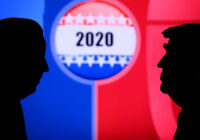As commentators in the US media continue to track and assess the accelerating decline of President Donald Trump’s prospects for reelection, some are wondering whether he will be tempted to organize a spectacular “October surprise” to magically overcome his ever-increasing gap in the polls. His behavior in recent days has appeared increasingly desperate, as demonstrated in this week’s shambolic Fox News interview with Chris Wallace.
Some have speculated that Trump may now be feeling the need to assert leadership in foreign policy after singularly failing to do so on the real crisis at hand: the national response to the coronavirus pandemic. Alexis Dudden, an expert on Korea and Japan, evokes two hypotheses that concern North Korea: “If it strikes Trump’s fancy in the middle of the night to fly to Pyongyang and meet Kim in an effort to appear presidential, he will. If it strikes Trump’s fancy in the middle of the night to order a militarized attack on a North Korean nuclear facility in an effort to appear presidential, he will.”
Political Behavior and Basketball Correctness
The Intelligencer sees another scenario, one that is less speculative based on events that are already taking place. In an article with the title, “Could War With Iran Be an October Surprise?” the author, Jonah Shepp, reviews recent events concerning a series of mysterious explosions affecting Iran’s nuclear facilities. There is more than a strong suspicion that Israel is responsible for at least some of the unusual incidents. Shepp highlights the value escalation may have for Israeli Prime Minister Benjamin Netanyahu, who has been under extreme pressure for more than a year through a series of inconclusive elections and is now desperate to find a way to escape the possible consequences of his trial for corruption.
Mitch Prothero, writing for Business Insider, suggests a direct connection between Netanyahu’s dilemma and Trump’s quandary in an article with the title, “Israel keeps blowing up military targets in Iran, hoping to force a confrontation before Trump can be voted out in November.” Trump may also be hoping that if Israel takes the lead, he will be justified in following through, with the hope that the nation would fall in line behind a wartime president.
Both Shepp and Prothero focus on the sense of urgency felt in Israel to profit from what may be the last few months of Trump’s presidency before he becomes a lame duck, as now seems nearly certain. Prothero explains that, for the moment, Israel’s decision has been “to follow the Trump administration’s lead of exerting ‘maximum pressure’ on the Iranians.” Prothero quotes an EU intelligence official: “The attacks appear to be part of a campaign of “maximum pressure, minimal strategy.”
Here is today’s 3D definition:
Maximum pressure:
In 21st-century diplomacy, political sadism directed against civilian populations to persuade them to respect interests and values that may be foreign to their culture
Contextual note
Shepp calls Israel’s attacks “short-of-war actions.” He predicts that an administration led by Joe Biden, the presumptive Democratic presidential nominee, “would probably not continue Trump’s ‘maximum pressure’ approach to Iran and would not be as solicitous of Israel’s covert operations.”
The EU official quoted above believes that “the Israeli plan here is to provoke an Iranian response that can turn into a military escalation while Trump remains in office.” The Israelis would thus aim at drawing the US deeper into a struggle that includes a very real potential of turning into a war. Trump is likely to play along if he believes it will make him look like a wartime president in the weeks before the November election.
The situation is risky for numerous reasons. None of the parties would welcome war itself, but the ratcheting up of tensions to the point at which the fear of hostilities becomes palpable might be seen as the last-minute trick that allows both Netanyahu and Trump to hold onto the reins of power that appear to be slipping from their respective hands.
Historical note
Following the disastrous experience of George W. Bush’s never-ending wars in the Middle East in what might be called more than maximum pressure on nations that fail to follow the American game plan, the past two US administrations have tended to turn to economic sanctions as the principal means of “persuading” governments to obey their dictates. Donald Trump has turned the policy into a reflex in his foreign policy. He routinely directs sanctions not only against recalcitrant nations but even against individuals, such as the members of the International Criminal Court who have dared to threaten an investigation of American or Israeli war crimes.
In an article on Al Jazeera, Eva Nanopoulos reminds readers that it was US President Woodrow Wilson who first launched the idea of economic sanctions. Once the trauma of World War I had passed, Wilson got to work looking for ways of imposing order while avoiding the messiness of war. His promotion of the League of Nations was a crucial element. The key to making the League of Nations work could only be economic sanctions, which Wilson described in this way: “Apply this economic, peaceful, silent, deadly [and] terrible remedy. It does not cost a life outside the nation boycotted but it brings a pressure upon the nation which, in my judgment, no modern nation could resist.”
President Wilson invented the logic of maximum pressure that has become the most used and abused tool in the foreign policy toolbox under the Trump administration. “There always was a degree of irony in Wilson’s juxtaposition of peace and death,” Nanopoulos writes.
Paradox might be a more appropriate word than irony to describe a policy that is both “peaceful” and “deadly.” There can be no greater moral failure and manifestation of hypocrisy than the deliberate inversion of a widely understood moral concept. Because people spontaneously think of war as a form of organized killing, they can be persuaded to think that so long as a state of war doesn’t exist, economic sanctions, which indirectly but just as surely cause death and suffering, may no longer be considered killing. After all, if there is no smoking gun, no crime has been committed.
Nanopoulos describes the result: “All served the same cause: to advance imperial ambitions without assuming the risks and responsibilities of war. With the establishment of the League of Nations, multilateral sanctions became part of an international arsenal used to effectively preserve the colonial status quo.”
It has become customary to invoke the famous “rule of law” that we use to characterize the world order after 1945. The aftermath of World War II saw the creation of the United Nations and a global financial system given a stable structure at Bretton Woods. It didn’t eliminate war, but it kept wars local while developing global trade. Nations and the UN began deploying the threat and the application of economic sanctions. Still, we should not lose from sight the links to European colonialism and emerging American imperialism that Wilson built into the notion of sanctions when he described them as being both peaceful and deadly.
Maximizing sanctions avoids war. But going to war can still have its merits, mainly in terms of electoral advantage for insecure and contested leaders. Margaret Thatcher demonstrated the principle in the Falkland Islands in 1982. This is traditionally called the tail wagging the dog. Whether it is done through war or simply through Wilson’s and Trump’s maximum deadly pressure, Shakespeare’s Macbeth probably had it right when — allowing for an appropriate adjustment in the spelling by substituting “tail” for “tale” — he called it “a tale told by an idiot, full of sound and fury, signifying nothing.”
*[In the age of Oscar Wilde and Mark Twain, another American wit, the journalist Ambrose Bierce, produced a series of satirical definitions of commonly used terms, throwing light on their hidden meanings in real discourse. Bierce eventually collected and published them as a book, The Devil’s Dictionary, in 1911. We have shamelessly appropriated his title in the interest of continuing his wholesome pedagogical effort to enlighten generations of readers of the news. Click here to read more of The Daily Devil’s Dictionary on Fair Observer.]
The views expressed in this article are the author’s own and do not necessarily reflect Fair Observer’s editorial policy.
Support Fair Observer
We rely on your support for our independence, diversity and quality.
For more than 10 years, Fair Observer has been free, fair and independent. No billionaire owns us, no advertisers control us. We are a reader-supported nonprofit. Unlike many other publications, we keep our content free for readers regardless of where they live or whether they can afford to pay. We have no paywalls and no ads.
In the post-truth era of fake news, echo chambers and filter bubbles, we publish a plurality of perspectives from around the world. Anyone can publish with us, but everyone goes through a rigorous editorial process. So, you get fact-checked, well-reasoned content instead of noise.
We publish 2,500+ voices from 90+ countries. We also conduct education and training programs
on subjects ranging from digital media and journalism to writing and critical thinking. This
doesn’t come cheap. Servers, editors, trainers and web developers cost
money.
Please consider supporting us on a regular basis as a recurring donor or a
sustaining member.
Will you support FO’s journalism?
We rely on your support for our independence, diversity and quality.






